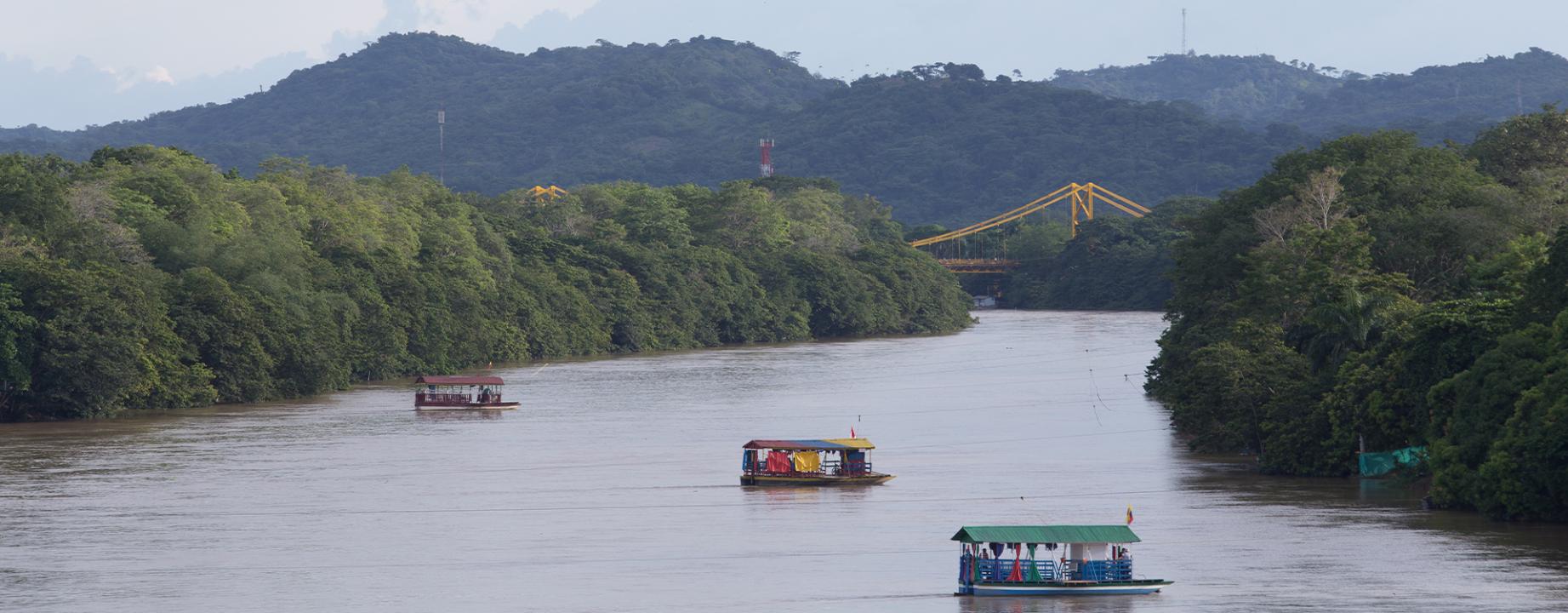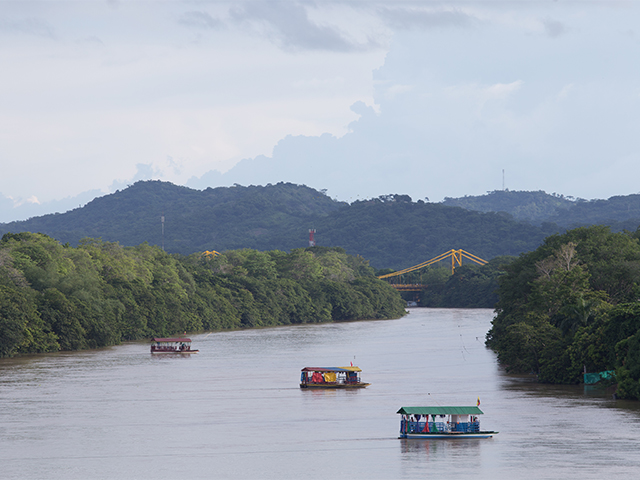Long-run development in Latin Americ

LSE - Stanford - Universidad de los Andes
Long-Run Development in Latin America
The Department of Economics at the Universidad de los Andes is going to host the third annual Uniandes-LSE-Stanford conference on long-run development on 30-31 May 2019.
Following our inaugural conference in Stanford in May 2017 and our second annual conference in LSE in May 2018, this multi-disciplinary event is coming to the Universidad de los Andes to probe the institutional, political, and economic drivers of long-run development. The majority of papers focuses on Latin America, but with important comparative research from Africa and Asia.
Conference Organizers: María del Pilar López-Uribe (LSE & Los Andes), Jean-Paul Faguet (LSE), Alberto Díaz-Cayeros (Stanford) and Fabio Sanchez Torres (Uniandes).
Recent years have seen a powerful resurgence in the political economy literature on development. Ideas about the role of institutions vs. factor endowments vs. human capital in driving economic growth and inequality have been advanced forcefully, and have been tested in a variety of contexts. The boldness of some of the assumptions and constructs (e.g. ‘colonial mortality’, ‘inclusive vs. extractive institutions’, AJR 2001, etc.; ‘institutional contagion’, ES 1997) have been challenged both on the ground of whether the empirical findings have the necessary nuance, and whether they are able to distinguish between key dimensions of the package of ‘institutions’ studied. The literature remains rich and provocative. The institutional intuition remains the main driver of various explanations, but “institutions” are often too high a level of aggregation for empirical tests to be fully convincing versus alterative theses.
Cross-country studies with creative identification strategies, and working with more disaggregated dependent and independent variables, are shedding new light on these debates. In our view, some of the methodologically most robust approaches involve subnational analysis exploiting subnational variation. Latin America offers an ideal context in which to develop such research, with huge variation across space and time in economic and human development outcomes, and also subnational institutions, human capital, public investment, factors and resources, and other political and geographic variables. In contrast to other developing regions, Latin America offers comparatively high-quality data, often available across very long periods of time.
New research by young scholars has taken up the challenge with preliminary results that are impressive and have a clear potential to remake the political economy of development. Examples of such work include Dell (2008), Díaz-Cayeros and Jha (2012), Guardado (2016), Alix and Sellars (2016), Faguet, Sánchez and Villaveces (2016), López-Uribe y Sánchez (2018), Valencia (2018), Naritomi et al. (2012), and Stasavage (2014) among others. Such studies typically use panel data from hundreds of observations across decades or centuries. When these units are subnational, the researcher can control much better for historical, macro-institutional, geographic, cultural, and other factors that bedevil identification in cross-country studies. The empirical quality and specificity of such an approach facilitates an analytical focus on complex, nuanced explanatory factors that are hard to treat in a cross-country context. Just as excitingly, efforts are currently underway to extract data from the early republican and colonial archives in several Latin American countries, and so develop much longer-term subnational databases over not decades but centuries.
The time is ripe to bring together research that serves simultaneously as major substantive findings, and also proof-of-concept for new empirical approaches. The Uniandes-LSE-Stanford conference seeks to explore more directly how long-run development patterns are driven by state capacity, land rights, and race/ethnicity and civic and political rights. We believe that political economy of Latin America work is on the verge of a major breakthrough in new approaches that will generate collaboration between historians, political scientists, economists and other social science scholars that will produce a new understanding of some of the most complex social issues of our time.
Agenda:
Wednesday 29 May 2019
10:00 -12:00 Lee Alston -Masterclass for Master Students and Phd Students on Institutional Analysis.
16:00 -18:00 Welcome drinks, Economics Department, Universidad de los Andes.
Thursday 30 May 2019
8:50 – 9:00 Juan Camilo Cardenas, Welcome and opening words.
9:00-11:00 Session 1: Institutions and State Capacity.
Discussant: Beatriz Magaloni (Stanford) y Ken Shadlen (LSE)
Chair: María López Uribe (Uniandes-LSE).
- Lee Alston (Indiana) “The Logic of Leadership”.
- Fabio Sanchez (Uniandes) “State Capacity, ethnicity and Industrialization in Colombia” with Irina España.
- Borge Wietzke (IBEI) “Impacts of colonial settler and missionary interventions on Institutions in Madagascar”.
- Stephen Haber (Stanford) “Ecological Origins of Political and Economic Systems”.
11:00 -11:15 Break
11:15 – 13:15 Session 2: Political Economy and Political Power.
Discussant: Carles Boix (Princeton) y Jean-Paul Faguet (LSE)
Chair: Fabio Sanchez (Uniandes)
- Elliot Green (LSE) “Roads and Regional Favouritism in Sub-Saharan Africa” with Munia Sanghamitra.
- Claudio Ferraz (PUC Rio) “Political Power, Elite Control and Long-Run development: Evidence from Brazil” with Frederico Finan and Monica Martinez Bravo.
- Jenny Guardado (Georgetown) “Protection or exposure? Overlapping Jurisdictions and Long-Term Development in Colonial Mexico”.
- Felipe Carozzi (LSE) “Sharing the Gains from Trade: LandAllocations after a large Trade Shock” with María del Pilar López-Uribe and Fabio Sánchez.
13:15-14:30 Lunch
14:30-15:30 Session 3: Conflict I
Discussant: Alejandra Irigoin (LSE)
Chair: Beatriz Magaloni (Stanford)
- Felipe Valencia (UBC) “Trust Unravelled: The Long Shadow of the Spanish Civil War”.
- Raul Sanchez de la Sierra (Berkeley) “Corruption in Hierarchies”.
15:30-15:45 Break
15:45-17:15 Sessión 4: Land and Institutions.
Discussant: Jonathan Weigel (LSE)
Chair: Leopoldo Fergusson (Uniandes).
- Maria Paula Saffon (UNAM) “The Legacies of Land Inequality on Development: Evidence from Argentina” with Carlos Freytes and Federico Tiberti.
- Allison Benson (LSE) “Adapting to Inclusive Institutions: The Case of Land Patronage in Colombia”.
- Nicolas Lillo (Javeriana) “Crop Choice and Productivity: Evidence from the Chilean Land Reform”.
17:15-17:20 Closing words
18:00-19:00 Public Lecture: “Inequality: the First Ten Thousand Years”, Room: SD 1003
Tim Kohler (Washington State University).
Chair: Fabio Sanchez (Uniandes)
Friday 31 May 2019
9:00 – 11:00 Session 5: Skills and Knowledge.
Discussant: Alberto Diaz-Cayeros (Stanford)
Chair: María López Uribe (Uniandes-LSE).
- Mara Squiciarini (Bocconi) “Knowledge Elites and Modernization: Evidence from Revolutionary France” with Nico Voigtländer.
- Javier Mejía (NYU-AD) “Social Networks and Entrepreneurship: Evidence from a Historical Episode of Industrialization”.
- Jeremiah Dittmar (LSE) “Economics Origins of Modern Science”.
- Agustina Paglayan (UC San Diego) "The political economy of educational content: Skills or values? Evidence from 100 years of national school curriculum policies in Argentina and Chile"
11:00-11:15 Break
11:15 -13:15 Session 6: Population and Migration
Discussant: Xavier Duran (Uniandes) y Alejandra Irigoin (LSE)
Chair: Juanita Villaveces (Universidad Nacional)
- Santiago Perez (UCDavis) “Southern (American) Hospitality: Italians in Argentina and the US during the Age of Mass Migration”.
- Emily Sellars (Yale) “Population Pressure, Government Response, and Agrarian Change in Jalisco, Mexico”.
- Lachlan McNamee (Stanford) “Becoming Black in Jamaica”
- Edgar Franco (Stanford) "Riot, Rebellion, and Lawsuits: Strategies of Indigenous Resistance and Assimilation to Colonial Rule"
13:15 – 14:30 Lunch
14:30-16:00 Session 7: Conflict II
Discussant: Leonard Wantchenkon (Princeton)
Chair: Fabio Sanchez (Stanford)
- Debin Ma (LSE) “Wars and States: China´s long March towards Unity and its Consequences, 221 BC-1911 AD” with Chen Suo.
- Leopoldo Fergusson (Uniandes) “Population and Conflict” with Daron Acemoglu and Simon Johnson.
- Emilio Depetris (PUC Chile) “Borderline Disorder: (De facto) Historical Ethnic Borders and Conflict in Africa”.
16:00-16:15 Break
16:15 – 17:45 Panel Discussion
Chairs: Jean-Paul Faguet (LSE) and Alberto Díaz Cayeros (Stanford).
- Carles Boix (Princeton)
- Beatriz Magaloni (Stanford)
- Leonard Wantchenkon (Princeton).
- Steve Haber (Stanford)
- Jose Antonio Ocampo (Banco de la República)
- Lee Alston (Indiana)
17:45 – 18:00 Invitation to Stanford 2020 and closing words
- Alberto Díaz-Cayeros (Stanford)
- María López Uribe (Uniandes-LSE)
- Jean-Paul Faguet (LSE)
- Fabio Sanchez (LSE).
19:00 Dinner, Tabula Restaurant, Address: Cl. 29 Bis # 5 – 90.
Saturday 1 June 2019
8:00-17:30 City Tour – Bogota.
19:00 Dinner and Dancing-Andres Carne de Res-Chia (optional).

